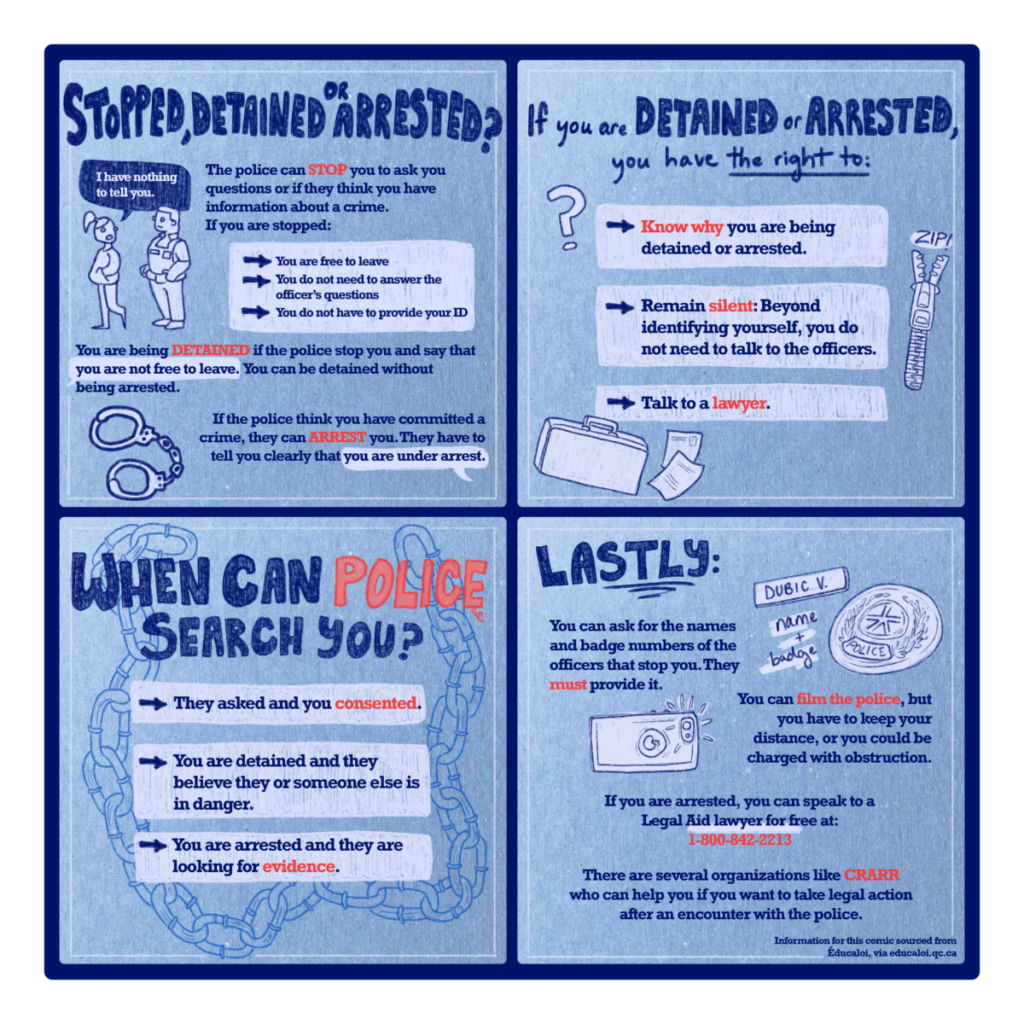The students will file complaints against the officers for excessive use of force
One night at the end of July, at almost 3 a.m., Concordia PhD students Amaechi Okafor and Wade Paul were walking on Saint-Jacques street, heading towards Okafor’s apartment in NDG.
As they walked, they saw police cruisers and officers gathered around an individual wrapped in a blanket. Not wanting to interfere with the situation, Okafor and Paul stepped into the street to go around the cruiser, then returned to the sidewalk.
“We didn’t even cross the road,” said Okafor. “I actually told him: ‘Let’s step on the road and avoid these cars and step back on the sidewalk,’ which we did for a split second. And all of a sudden, we just hear yelling.”
“Next thing I kind of remember, there was a police car coming up onto the sidewalk,” recalled Paul. Okafor said the intervention was “very, very aggressive.”
The officers were speaking French, and while Okafor speaks French, neither student could understand the officers’ accent—Okafor is an international student from Nigeria, and Paul is from St. Mary’s First Nation in New Brunswick. When told this, the officers switched to English and requested to see Okafor’s ID.
Okafor and Paul asked why they needed his ID, and the officers said that it was because they had been jaywalking. The students asked for clarification, at which point the officers asked to see Paul’s ID as well.
“They said […] that we were under arrest,” said Paul. “I had my arm kind of twisted, I was thrown up against a fence. I had my rights started to be read to me. I was in full panic mode.”
“The way the arrest went was really strange for me because it’s something I’d never experienced,” said Okafor. He recalls being put to the fence, handcuffed from the back and searched from top to bottom.
He was then put against the cruiser, where the officers spread out his legs so far that his pants ripped and searched him again, he said. This also affected his old knee injuries, and he is still suffering from knee pain a month after the arrest. He said the pain makes it hard for him to walk and work.
“I felt abused. I think that was the word to use. Because I didn’t give them the right to touch me all over where they touched me,” said Okafor.
The students said they were put in separate police cruisers, where they were left alone for 20 minutes. Officers went through their belongings and wallets, and did not explain what was happening. Okafor said they never read him his rights.
Both were fined $49 for jaywalking and $499 for refusing to show their ID.
Since the incident, Okafor’s family has joined him in Canada. He waited two years before bringing them here, wanting to make sure it was a safe place for them. Now, he fears what happened to him might happen to his three children.
“If my son is 16-17, what would happen if a cop were to stop him like that?” he asks. “I don’t want to lose my son because I’m ambitious.”
The students have pleaded not guilty to their fine. With the help of the Center for Research-Action on Race Relations (CRARR) and its executive director Fo Niemi, they are planning on filing complaints with the Quebec Human Rights and Youth Rights Commission for Racial Profiling and with the Quebec Police Ethics Commissioner.
“The only down thing is that the law, as it stands right now, will allow these officers not to cooperate with the Police Ethics Commissioner investigation,” explained Niemi. “Because they have the so-called constitutional right to silence. Not to incriminate oneself.”
Niemi is hopeful that the misconduct charges for excessive use of force will go far. “Just the fact that they were handcuffed, that’s a form of force that was used excessively,” he said.
“It all goes far to speak on how unsafe international students should feel,” he said. “Because if that could happen to me, it could happen to any other person.”
After hearing his story, other international students told him that they were worried about their own safety.
Niemi stressed the importance of speaking out about these situations. “Just because you’re international students, it doesn’t mean you have less rights when it comes to this.”
The SPVM declined to comment on the intervention.





